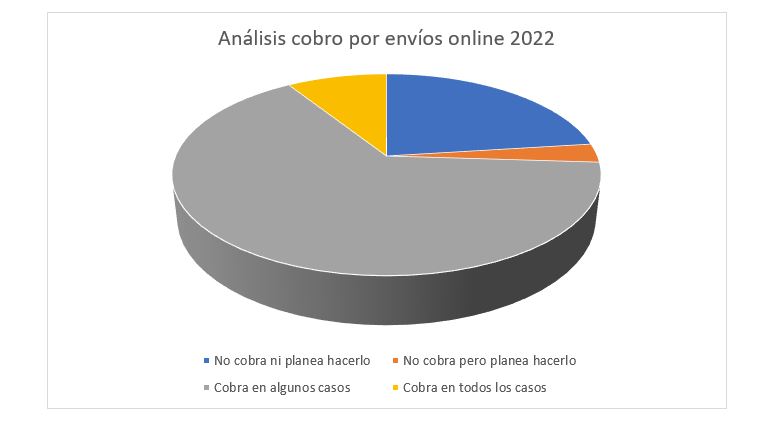Digital consultant
since 2005
In this post we are going to analyse the initiatives concerning the charging for online shipments in fashion shops. For some years now, buying goods and services online has become an option that makes it easier for us to meet our needs.
And although the growth of e-commerce The position and acceptance of the new Coronavirus has gradually increased over the last few years. Especially during the period of the new Coronavirus pandemic it gained momentum.
Due to the increase in the number of online shops, we have analysed the handling of shipments from fashion shops, in order to assess whether it is common for fashion shops to charge for the shipment of goodsor whether companies prefer not to do so.
The Barometer of Fashion Companies in Spain 2022 allows for a much broader perspective on the issue. And we have identified the most salient approaches, which will be outlined below.
The cost of transport: a challenge for online shops
While online shops can benefit from various resources and tools, and even have certain facilities to connect with a much larger audience, they also face certain challenges.
And one of the biggest challenges facing companies in the fashion industry is the high cost of transport service for distribution of the goods. With rising fuel prices, this service has become increasingly expensive.
This leads companies to enter into a profound debate: Is it necessary to charge for online shipments in fashion shops? And this question is also related to another major challenge, the high level of competition in this sector.
A few years ago, consumers used to buy certain services online, such as airline tickets or movie tickets. But as time went by, the idea of buying a variety of products became more common.
And with the interest in buying products online, the clothing or fashion niche itself became very important. In the face of high demand, there was also strong competition.There are more and more online shops dedicated to the sale of products in this sector.
One of the vendors' initiatives to differentiate themselves from competitors has been to either not charge for shipping their products or to have extremely low shipping rates.
In addition to the attempt of free deliveries, these companies have also delegated their efforts to be able to provide deliveries with extremely short delivery time. So it is not only free of charge, but also of the highest quality.
Considering the high cost and effort involved in various logistical processes in fashion companies, this action, designed to maintain a great corporate image, could be less profitable.
So, what is the view on charging for online shipping in fashion shops? This is precisely what we will be analysing in detail in this post. Based on the study of the Barómetro de Empresas de Moda en España 2022.
Analysis of online delivery charges for fashion retailers 2022
The study assessed the preference of fashion companies that also distribute their products online for charging their customers for the delivery of goods.
All of this with the intention of learning not only about current management, but also about the possible changes that could be implemented in the future in this sector.
It is extremely important to be aware of initiatives in this field in order to be consistent with the current market context.
- Percentage of companies that do not charge for shipping: At least 23% of fashion companies do not charge for delivery, and not only do they not charge for delivery, but they do not plan to do so.
- Ratio of companies that do not charge for shipping but plan to do so: At least 3% of the most influential Spanish companies in the sector do not charge for freight forwarding and have no plans to do so in the future.
- Level of companies that always charge for shipping: 9% of the influential companies in the fashion sector in Spain have a policy of charging for the delivery of their products at all times.
Analysis of online shipping charges for fashion retailers in Spain has shown a higher percentage of companies charging for shipping only in some cases.
It is estimated that 65% of the companies plan to charge for this service. depending on the case. Often these companies have criteria for deciding whether or not to charge. For example, depending on the distance of the shipment or the volume of the purchase.
On the other hand, some companies that charge for delivery in certain cases often have optional express delivery plans. That is, so that the customer can choose whether to receive his or her purchase in a shorter period of time.
According to the assessed data on the outlook and the situation of online delivery charges in fashion shops, it is clear that the 74% of fashion companies charge for this service.either always or only in certain cases.
What happens in case of returns?
When assessing the handling of the handling of online delivery charges in fashion shops in the immediate and long term, there is one relevant issue. This is the returns situation.
When there is a return process in a physical shop, the customer comes to the premises. But with online returns, there is a logistical process that incurs costs for the company.
Given this reality, what estimates do companies have? Basically, more than 50% of the companies in this sector, are considering charging for the return service of purchases made in online shops.
But how common is a return in this sector? It is very common! This is reflected in the report of the National Observatory of Technology and Society (Ontsi).
Finally, only 20% of the companies in this sector charge for the return of products, but this percentage is expected to increase in the coming years, mainly due to the high cost of logistics processes.









































